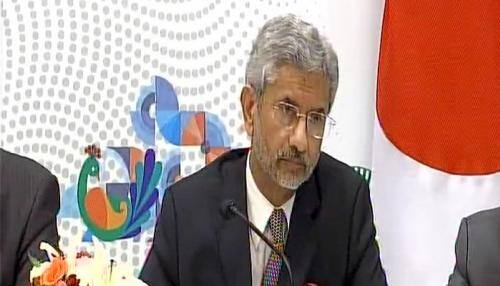- News>
- India
Rohingya issue appeared as passing mention between PM Narendra Modi, Shinzo Abe: Foreign Secy

As Prime Minister Narendra Modi and his Japanese counterpart Shinzo Abe on Thursday laid the foundation stone for Ahmedabad-Mumbai high-speed bullet train, Foreign Secretary of India S. Jaishankar stated that both the nations are trying to elevate strategic partnership.
New Delhi: As Prime Minister Narendra Modi and his Japanese counterpart Shinzo Abe on Thursday laid the foundation stone for Ahmedabad-Mumbai high-speed bullet train, Foreign Secretary of India S. Jaishankar stated that both the nations are trying to elevate strategic partnership.
Speaking to ANI, Jaishankar said, "The aim is to elevate strategic partnership. Trying to align each other's approach towards the world."
Taking about India-Japan defence forces, Jaishankar said, "Till now thrust of the contacts and cooperation have been on maritime security." "We agreed to explore cooperation and exchanges between our Army and ground self-defence force and Air Force and Japan's Air Defence Force," he said.
Jaishankar further said, "Agreed on Japan-India Act East Forum. It'll explore possibilities of including Japan in North East infrastructure development."
"Rohingya issue did not come up for any specific discussion, it came only as a passing mention," he said.
Meanwhile, the Doklam standoff between India and China appears to have figured in talks between PM Modi and his Japanese counterpart Abe today, reported IANS.
A joint statement released after the meeting between Modi and Abe did not mention the standoff, Jaishankar, when asked about the issue at a media briefing, said "regional and global developments" were discussed.
"Doklam is not specifically mentioned in the statement," he said.
"I think there was a discussion on regional and global developments yesterday (Wednesday) in the broader sense of the term," he said, referring to the closed-door discussions between the two leaders in Ahmedabad.
Indian and Chinese troops were involved in a standoff at Doklam in the Sikkim sector for two and a half months, which was resolved on August 28 ahead of the BRICS summit hosted by China. In another border incident, Indian and Chinese troops got into a scuffle in Ladakh which saw the soldiers from both sides pelting stones at each other and fist-cuffing.
